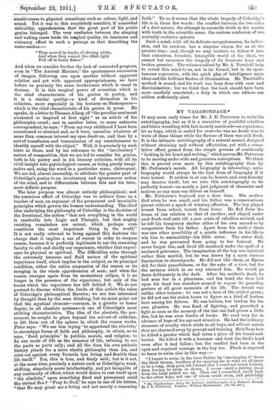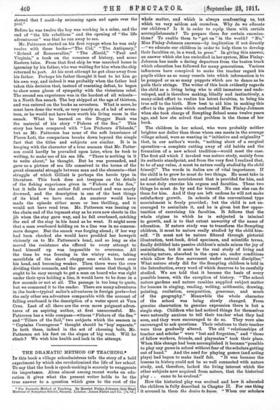MY VAGABONDAGE.* IT may seem early times for Mr. J.
E. Patterson to write his autobiography, but as it is a narrative of youthful rebellion and bitter wrestling with fate in early manhood—an experience, let us hope, which is ended for ever—he was no doubt wise to write of these things while the flavour of them was still fresh.
It is the intimate autobiography of a natural nomad, designed without straining and without affectation, yet with a cumu- lative effect, gained from the simple process of continually " looking in his heart and writing," which proves Mr. Patterson to be moving under wide and generous conceptions. We think this is proved even more by this autobiography than by Mr. Patterson's novels. All biography is interesting; auto- biography would always be the best form of biography if it were honest. It seldom is, or can be, honest, and even honesty may deceive itself ; but we take this autobiography to be perfectly honest—as nearly a just judgment of character and motives as any man can deliver on himself.
Mr. Patterson's boyhood was a dour time. His mother died when he was small, and his father was a conscientious parent without a spark of winning affection. The boy played truant from school, truant from home. He fled from the house of one relation to that of another, and stayed under each fresh roof only till a new crisis of rebellion arrived, and he left his temporary shelter either of his own accord or by compulsion from his father. Apart from his mother there was one other possibility of a gentle influence in his life to win him to amenability—his little sister. The sister died, and he was prevented from going to her funeral. He never forgot this, and lived till manhood under the spell of a nurtured grievance. The imagination of the boy was mystical rather than morbid, but he was drawn by a most curious fascination to churchyards. He did not like them, as Byron did, for their peacefulness, or for the sake of a view, but for the eeriness which in no way alarmed him. He would go there deliberately in the dark. After his mother's death he had seen her in a phantasm, and the hand she then laid upon his head has somehow seemed to repeat its guarding gesture at all great moments of his life. The truant was unlike other truants : he was not a hero of the cricket green ; be did not use his stolen hours to figure as a kind of lawless hero among his fellows. He was lawless, but lawless for his own pleasure. He was fond of fighting, and provoked a fight as soon as the memory of the last one had grown a little dim, but he was even fonder of books. He read very far in advance of boys of his age and situation. He had the ordinary
elements of cruelty which abide in all boys, and will out unless they are charmed away by precept and training. He tensile how he killed a gander which had eaten a piece of his bread-and- butter. He killed it with a hammer and .beat the bird's head even after it had fallen ; but the conflict had been in the open and required courage in the boy too. Pluck is required
to learn to swim also in this way :—
" I learnt to swim, in the river Calder, by 'one-legging it' down the black stream, heedless of its carrying me to what we all knew to be a long, deep pool, till I found that I could not touch bottom, then having to swim or drown. I swam—until a jutting shoal from the bank pulled me up. Then out I scrambled, raced back to the other boys, not one of whom could swim, and pridefully • ify Vagabondage: being the Intimate Autobiography of a Nature's Nomad. By J. E. Patterson. London : William Heinemann. [Be. 6d. net.]
showed that I eauld--by swimming again and again over the pool."
Before he was twelve the boy was working in a mine, and the end of " the life rebellious " and the opening of " the life adventurous" was that he ran away to sea.
Mr. Patterson started on his first voyage when he was only twelve with these books—" The Cid," " The Antiquary," "Roland of Roncesvalles," " The 2Eneid," "Paul and Virginia," a book on the romance of history, and some Eastern tales. From that first ship he was marched home in ignominy by his father, who was waiting for him when the ship returned to port. At his next attempt he got clear away from his father. Perhaps his father thought it best to let him go his own way, and indeed it was probably when the father had taken this decision that instead of resenting defeat, he began to show some gleam of sympathy with the victorious rebel. The second sea experience was in the hardest of all schools— in a North Sea smack. The boy shipped at the age of thirteen, and was entered on the books as seventeen. What is more, he must have done the work, or very nearly so, of a lad of seven- teen, or he would not have been worth his living room in the smack. What be learned on the Dogger Bank was the material of his story " Fishers of the Sea." This story has been compared with " Les Pecheurs d'Islande," but as Mr. Patterson has none of the soft luxuriance of Pierre Loti, the comparison breaks down beyond the simple fact that the titles and subjects are similar. It is in keeping with the character of a true seaman that Mr. Patter- son could hardly be prevailed upon later, when he took to writing, to make use of his sea life. "There is nothing in it to write about," he thought. But he was persuaded, and gave us a picture of sea life conceived in the terms of the great elemental struggle between man and the elements—that struggle of which Gilliatt is perhaps the heroic type in literature. This book does not trespass on the details of the fishing experience given in " Fishers of the Sea," but it tells how the author fell overboard and was nearly drowned, and the description is one of the best things of its kind we have read. An amateur would have made the episode either more or less thrilling, and it would not have read true. Mr. Patterson was leaning on the chain end of the topmast stay as he rove new sheets in the jib when the stay gave way, and he fell overboard, catching the end of the stay in his hand as he went. It might seem that a man overboard holding on to a line was in no consum- mate danger. But the smack was forging ahead ; if her way had been checked she would have prodded her bowsprit viciously on to Mr. Patterson's head, and so long as she moved the resistance she offered to every attempt to haul himself up was impossible to overcome. All the time he was freezing in the wintry water, taking mouthfuls of the short choppy seas which burst over his head, and becoming weaker. Then there were the crew dividing their counsels, and the general sense that though it ought to be easy enough to get a man on board who was right under their eyes holding a line, it would have to be done in a few seconds or not at all. The passage is too long to quote, but we commend it to the reader. There are many adventures in the book—typical sailor's adventures in foreign ports—but the only other sea adventure comparable with the account of falling overboard is the description of a water spout at Vera Cruz. Last of all there are the even more poignant adven- tures of an aspiring author, at first unsuccessful. Mr. Patterson has a wide compass—witness "Fishers of the Sea" and "Tillers of the Soil," two subjects which the seamen in " Captains Courageous " thought should be "kep' separate." In both these, indeed in the act of choosing both, Mr. Patterson set his foot on the slopes of big work. Will he climb ? We wish him health and luck in the attempt.







































 Previous page
Previous page